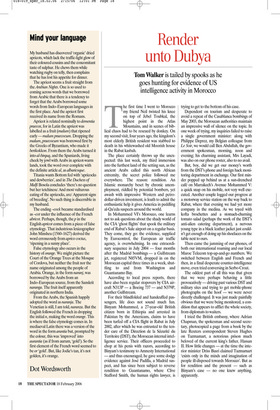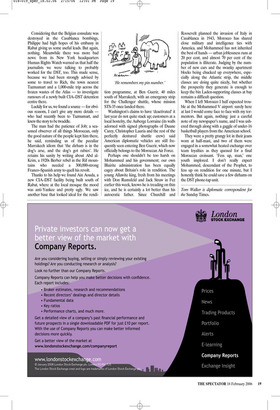Render unto Dubya
Tom Walker is tailed by spooks as he goes hunting for evidence of US intelligence activity in Morocco The first time I went to Morocco my friend Neil twisted his knee on top of Jebel Toubkal, the highest point in the Atlas Mountains, and in scenes of biblical chaos had to be rescued by donkey. On my second visit, four years ago, the kingdom’s most elderly British resident was stabbed to death in his whitewashed old Moorish house in the Rabat kasbah.
The place certainly throws up the unexpected: this last week, my third immersion into the furthest land of the setting sun, as the ancient Arabs called this north African extremity, the secret police followed me everywhere. The reason: rendition. An Islamic monarchy beset by chronic unemployment, riddled by potential bombers, yet awash with impressive Western and petrodollar-driven investment, is loath to admit the enthusiastic help it gives America in peddling al-Qa’eda suspects around the world.
In Mohammed VI’s Morocco, one learns not to ask questions about the shady world of the CIA ‘ghost flights’ that spook the military end of Rabat’s Sale airport on a regular basis. They come, they go: the evidence, supplied by Eurocontrol, the European air traffic agency, is overwhelming. In one extraordinary sequence in July 2004 — four months after the Madrid bombings — a Gulfstream jet, registered N85VM, dropped in on the Moroccan capital three times in a week, shuttling to and from Washington and Guantanamo Bay.
According to local press reports, there have also been regular stopovers by CIA aircraft N313P — a Boeing 737 — and N379P, another Gulfstream.
For their blindfolded and handcuffed passengers, life does not sound much fun. Binyam Mohammed, a 27-year-old British citizen born in Ethiopia and arrested in Pakistan by the Americans, claims to have been turfed off a CIA flight in Rabat in July 2002, after which he was entrusted to the tender care of the Direction de la Sécurité du Territoire (DST), the Moroccan internal intelligence service. Their officers proceeded to chop at his penis with razors, according to Binyam’s testimony to Amnesty International — and thus encouraged, he gave some dodgy evidence against José Padilla, a Madrid suspect, and has since been subject to reverse rendition to Guantanamo, where Clive Stafford Smith, the human rights lawyer, is trying to get to the bottom of his case.
Dependent on tourism and desperate to avoid a repeat of the Casablanca bombings of May 2003, the Moroccan authorities maintain an impressive wall of silence on the topic. In one week of trying, my inquiries failed to raise a single government minister: along with Philippe Deprez, my Belgian colleague from Le Soir, we would call Ben Abdullah, the government spokesman, morning, noon and evening; his charming assistant, Mrs Layadi, was also on our phone roster, also to no avail.
But, boy, did we get our money’s worth from the DST’s phone and foreign hack monitoring department in exchange. Our first minder popped up behind us at a sun-drenched café on Marrakech’s Avenue Mohammed V: a quick snap on his mobile, not very well executed. Another couple logged our progress at a motorway service station on the way back to Rabat, where that evening we had yet more company in the medina. As we toyed with kofta brochettes and a stomach-churning tomato salad (perhaps the work of the DST’s anti-alien catering department), a nervous young type in a black leather jacket just couldn’t get enough of doing up his shoelaces on the table next to ours.
Then came the jamming of our phones, of both our international roaming and our local Maroc Telecom top-up-and-go numbers. We switched between English and French and then, in a final desperate counter-intelligence move, even tried conversing in Serbo-Croat.
The oddest part of all this was that given that we were perhaps behaving a little provocatively — driving past various DST and military sites and trying to get mobile-phone photographs on the hoof — we were never directly challenged. It was just made painfully obvious that we were being monitored, a condition that appears to afflict the whole society, from diplomats to waiters.
I tried the British embassy, where Adrian Chapman, the spokesman and second secretary, photocopied a page from a book by the late Reuters correspondent Steven Hughes on Tazmamart, a notorious prison much beloved of the current king’s father, Hassan II. How little changes — at the time the interior minister Driss Basri claimed Tazmamart ‘exists only in the minds and imagination of people ill-disposed towards Morocco’. But as for rendition and the present — such as Binyam’s case — no one knew anything, apparently. Considering that the Belgian consulate was destroyed in the Casablanca bombings, Philippe had high hopes of his embassy in Rabat giving us some useful leads. But again, nothing. Meanwhile there was more bad news: from its New York headquarters Human Rights Watch warned us that half the journalists we were talking to probably worked for the DST, too. This made sense, because we had been strongly advised by some to travel to Rich, the town nearest Tazmamart and a 1,000-mile trip across the frozen wastes of the Atlas — to investigate rumours of a newly built CIA–DST detention centre there.
Luckily for us, we found a source — for obvious reasons, I can’t give any more details who had recently been to Tazmamart, and knew the story to be twaddle.
The man had the patience of Job; a seasoned observer of all things Moroccan, only the good nature of the people kept him there, he said, reminding us of the peculiar Marrakech idiom that ‘the dirham is in the dog’s arse, and the dog’s got rabies’. He retains his sanity by writing about Abd alKrim, a 1920s Berber rebel in the Rif mountains who needed a 300,000-strong Franco–Spanish army to quell his revolt.
Thanks to his help we found Ain Aouda, a new CIA–DST facility being built south of Rabat, where at the local mosque the mood was anti-Yankee and pretty ugly. We saw another base that looked ideal for the rendi tion programme, at Ben Guerir, 40 miles south of Marrakech, with an emergency strip for the Challenger shuttle, whose mission STS-35 once landed there.
Washington’s claims to have ‘deactivated’ it last year do not quite stack up; customers at a local hostelry, the Auberge Lorraine (its walls adorned with signed photographs of Duane Carey, Christopher Lauria and the rest of the perfectly dentured shuttle crew) said American diplomatic vehicles are still frequently seen entering Ben Guerir, which now officially belongs to the Moroccan Air Force.
Perhaps one shouldn’t be too harsh on Mohammed and his government; our own Blairite administration has been equally cagey about Britain’s role in rendition. The young Allawite king, fresh from his meetings with Don Rumsfeld and Jack Straw in Fez earlier this week, knows he is treading on thin ice, and he is certainly a lot better than his autocratic father. Since Churchill and Roosevelt planned the invasion of Italy in Casablanca in 1943, Morocco has shared close military and intelligence ties with America, and Mohammed has not inherited the best of hands — urban joblessness runs at 20 per cent, and almost 70 per cent of the population is illiterate. Judging by the number of new cars and the swanky apartment blocks being chucked up everywhere, especially along the Atlantic strip, the middle classes are doing quite nicely, but whether the prosperity they generate is enough to keep the bin Laden-supporting classes at bay remains a difficult question.
When I left Morocco I half expected trouble at the Mohammed V airport: surely here at last I would come face to face with my tormentors. But again, nothing: just a careful note of my newspaper’s name, and I was ushered through along with a gaggle of under-16 basketball players from the American school.
They were a pretty grungy lot in their jeans worn at half-mast, and two of them were engaged in a somewhat heated exchange over team loyalties as they queued for a final Moroccan croissant. ‘Fess up, man,’ one youth implored. I don’t really expect Mohammed, descendant of the Prophet, to fess up on rendition for one minute, but I honestly think he could save a few dirhams on the DST phone-tap unit.



















































































 Previous page
Previous page